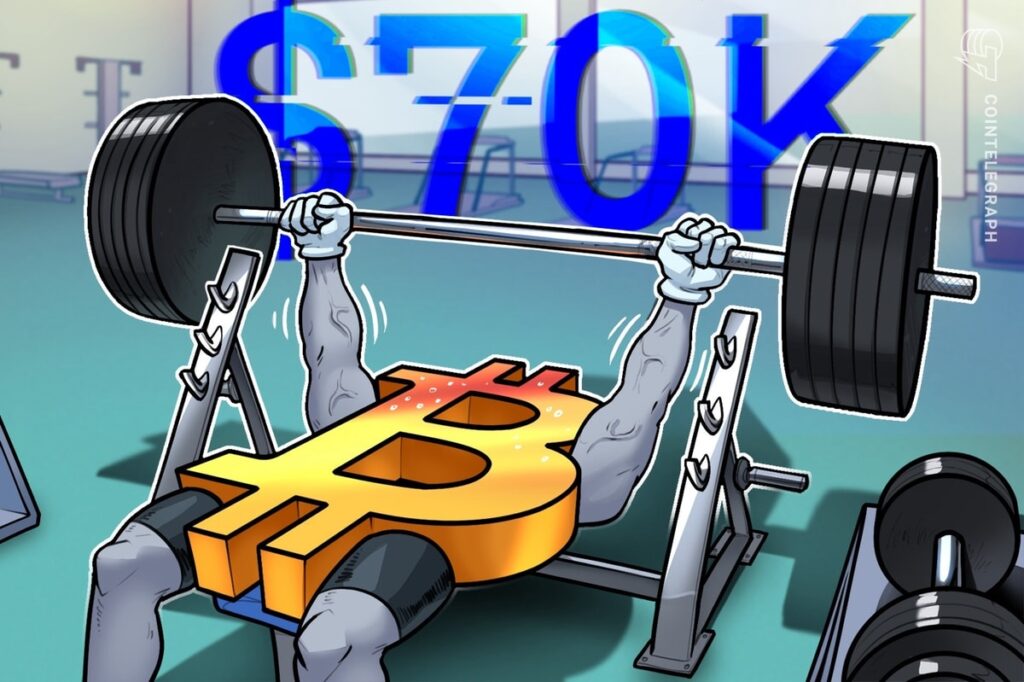Bitcoin chases $70K as global tensions ease and crypto traders delay US election

The price of Bitcoin (BTC) rose 3.2% between October 27 and October 28, briefly testing the $69,200 level for the first time in a week. Although the rally has faced some resistance, Bitcoin bulls believe the conditions are in place for further growth, especially given recent sociopolitical and economic developments.
US 6-month Treasury yields (left) versus oil WTI/USD (right). Source: TradingView
To start the week, oil prices fell more than 5.5% on October 28 as the ongoing conflict in the Middle East failed to affect energy production and transportation routes. Israel attacked Iran over the weekend; But no oil or nuclear facilities were targeted, according to CNBC.
Traders who initially turned to oil to hedge against Middle East tensions may now be exploring alternative hedge assets, as regional instability continues. According to CNBC, Israel and Iran have been engaged in a “shadow war” for more than a year, despite US officials warning Israel against targeting nuclear sites in Iran.
Does Uncertainty Benefit Bitcoin's Price?
Inflation is still a key concern that may drive traditional finance investors to alternative assets. While higher prices may support corporate income in the short term, persistent inflation will eventually pressure consumers to cut back on spending.
Because corporate earnings often reflect past consumer demand, companies report results from previous quarters, creating a “lagged effect,” which can mask the current impact of inflation on spending trends.
The next US inflation report is on October 31, followed by the Federal Open Market Committee meeting on November 7. Analysts expect a 0.3% increase in the core personal consumption expenditures (PCE) index in September. In August. Both the PCE index and labor market data are among the preferred indicators of the Fed's policy decisions.
US Personal Consumption Expenditure Index. Source: Federal Reserve
Will Stitt, bond portfolio manager at Wilmington Trust, said, “I think they (the FOMC) can pause and argue with the 50 basis points cut before. Although most markets expect further interest rate cuts, the main risk is that the conservative Federal Reserve will now pause rate adjustments to better gauge the risk of overheating the economy.
In addition, with the US presidential election now less than 10 days away, investors are increasingly risk-averse, leaning towards cash and short-term government bonds to minimize potential surprises. History shows that choices can sometimes be out of place, leaving everyone on edge.
Regardless of which candidate wins, the reduced uncertainty after the election could lead to an influx of risk assets, including Bitcoin. From a socio-political perspective, conditions seem to favor a sustained Bitcoin rally, although some factors pose risks, leading traders to hold off on more significant bullish activities.
Related: Bitcoin Needs Something to Hit and Hold $70K
It should be noted that higher-than-expected inflation underlines Bitcoin's stable and predictable monetary policy, reducing the chances of further central bank stimulus. Additionally, the victory of US presidential candidate Kamala Harris may not have an immediate impact on digital assets, although it may signal a more transparent approach to crypto regulation.
So, while Bitcoin may not make a new all-time high in 2024, There are reasons to expect that early 2025 will be favorable for price appreciation.
This article is not intended for general information purposes and should not be construed as legal or investment advice. The views, ideas and opinions expressed herein are solely those of the author and do not necessarily represent the views and opinions of Cointelegraph.












